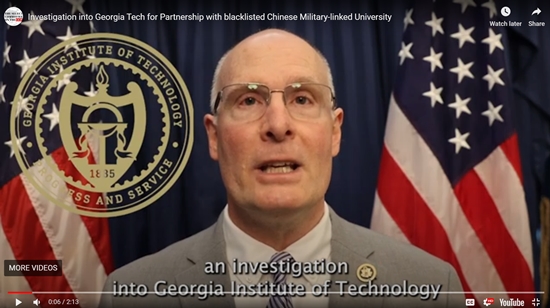
American universities like Georgia Tech should not be collaborating with Chinese universities to make things for the Chinese military that could be used in attacks against the United States. To anyone with even a mild concern for America’s security, can this be a controversial proposition?
The consideration is apparently hard to keep in mind, though, when weighing how to institutionally spend taxpayer dollars and how to obtain further funding. Item A, U.S. taxpayer money, goes to B, which works with C to produce D, of great interest and usefulness to E, a determined and gargantuan enemy of the United States that also provides funding for the work of B and C.
If it were not for language and memory, the relationships among A, B, C, D, and E, and the hazards involved, would be too much to keep track of. Surely, persons overseeing a university’s scientific and technological research can keep it all in mind even despite the lure of Fruitful Academic Collaborations (FACs).
PRC funding
But it seems that FACs can get in the way of facts. So the latest chairman of the House Select Committee on the Chinese Communist Party, John Moolenar, in May 2024 announced an investigation “demanding answers from Georgia Tech regarding its partnership with Tianjin University, a Chinese university with significant ties to the Chinese military, the People’s Liberation Army….
“The lawmakers decried Georgia Tech’s use of its Department of Defense research institute to fund sensitive research with Tianjin University, which was placed on a U.S. government blacklist for stealing American technology with military applications. Moreover, the lawmakers expressed concern over millions of dollars that Georgia Tech accepted from the People’s Republic of China (PRC) to support its partnership with the blacklisted university, in addition to other PRC funding that the university appeared to neglect reporting to U.S. officials.”
Enough of the investigation had been done by then to warrant a letter to the president of Georgia Tech, Ángel Cabrera, wondering why, “Despite Tianjin University’s links to the PLA and its efforts to steal dual-use U.S. trade secrets, Georgia Tech has continued collaborating with the university as it has done since at least 2013.”
Or why Georgia Tech has been coy about receiving funding from the Shenzhen government of “at least $250 million for the construction of the Georgia Tech Shenzhen Institute campus, signifying its importance to the PRC government.”
Damage assessment
So that the Committee may “assess the damage done to American national security through Georgia Tech’s partnership,” could Georgia Tech fill in the blanks about what it’s been up to here?
The letter was sent. Now what happens? Will the university suffer a penalty? Will the U.S. maybe stop sending American tax dollars to Georgia Tech to send to China? Will Georgia Tech stop collaborating with the Chinese on matters of military value? Will Mr. Cabrera answer the Committee’s letter?
Also see:
SelectCommitteeOnTheCCP.house.gov: Letter to Ángel Cabrera
YouTube: Video: “Investigation into Georgia Tech for Partnership with Blacklisted Chinese Military-linked University”





